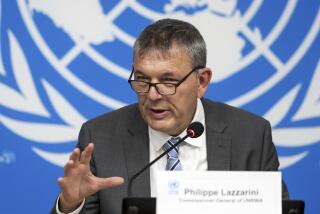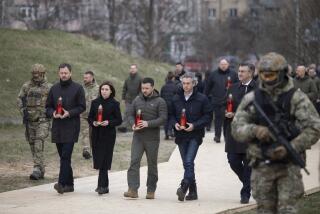U.N. Dismisses 30 in Balkans Mission for Corruption : Scandal: Soldiers and civilians stood accused of misconduct. It included black-marketing and visits to a Serb-run brothel.
- Share via
ZAGREB, Croatia — The troubled U.N. mission in the former Yugoslav republics disclosed Thursday that it has dismissed 23 soldiers and seven civilians for corruption following an investigation into allegations of widespread criminal activity in its ranks.
But Austrian Gen. Guenther Greindl, who conducted the internal probe of one of the largest and most expensive U.N. peacekeeping forces in history, brushed off the most serious accusations as unfounded or lacking enough evidence to prosecute.
Greindl’s probe was ordered by former U.N. Protection Force chief Thorvald Stoltenberg after media reports last fall, both in former Yugoslav republics and in Western newspapers, detailed instances of misconduct by U.N. soldiers. The alleged misconduct ranged from black-market sales of pilfered gasoline to patronizing a Serb-run brothel near Sarajevo where Muslim women were imprisoned as sex slaves.
Greindl said the inquiry confirmed his impression that “there were a few black sheep in the herd.” But he and Stoltenberg’s newly appointed replacement as civilian chief of the U.N. mission, Yasushi Akashi of Japan, insisted the abuses were neither widespread nor systematic.
“I do not think that the ratio of illegal acts we’ve witnessed here is out of proportion to what might take place in a U.N. peacekeeping operation,” Akashi told a news conference called to discuss the report that was delivered to U.N. headquarters in New York nearly two months ago.
“Having said that,” he added, “even small, isolated instances or acts are regrettable.”
Neither Greindl nor Akashi shed much light on the more serious reports of misconduct by U.N. troops, including accusations of gunrunning for various combatants, drug trafficking by U.N. personnel, sale of pilfered humanitarian aid to hungry civilians and the delivery of food to certain armed factions with the aim of strengthening their position in the conflict.
“While there were cases of impropriety, there were only a limited number of cases in which illegality was firmly established,” Akashi said. “Personnel who were found to have acted improperly have been reprimanded. In those cases where the evidence suggested illegality, personnel have either been repatriated or dismissed from their jobs with the United Nations.”
Greindl said 23 soldiers had been dismissed from the force as a consequence of the investigation--19 Ukrainians and four from Kenya’s contingent.
Although the U.N. officials said the infractions they could prove were all committed by individuals, some national contingents have been suspected of abusing their role in the humanitarian effort in order to make money out of the Balkan misery.
Russia and Ukraine have been among the most eager participants in the Balkans mission, as both former Soviet republics are burdened with too many soldiers in the post-Cold War era and too little money to support them.
*
Greindl’s report made no mention of the former Russian commander of U.N.-patrolled “sector east” in Croatia. Alexander Khromchenkov, who served 12 months as one of the United Nations’ most senior officers in the Balkans force, has been seen driving around the Serb-held territory in a white Mercedes reportedly given to him by Serbian gunmen who have employed him as a “consultant” since he completed his peacekeeping tour.
Greindl said parts of his investigation were continuing, including inquiries into claims by Bosnian government officials that Canadian and other U.N. officers based in Sarajevo frequented a Serb-run nightspot called Sonja’s Kon Tiki, where captive Muslim women were forced into prostitution.
Greindl estimated that the investigation will be concluded by the end of February or early March.
More to Read
Sign up for Essential California
The most important California stories and recommendations in your inbox every morning.
You may occasionally receive promotional content from the Los Angeles Times.














